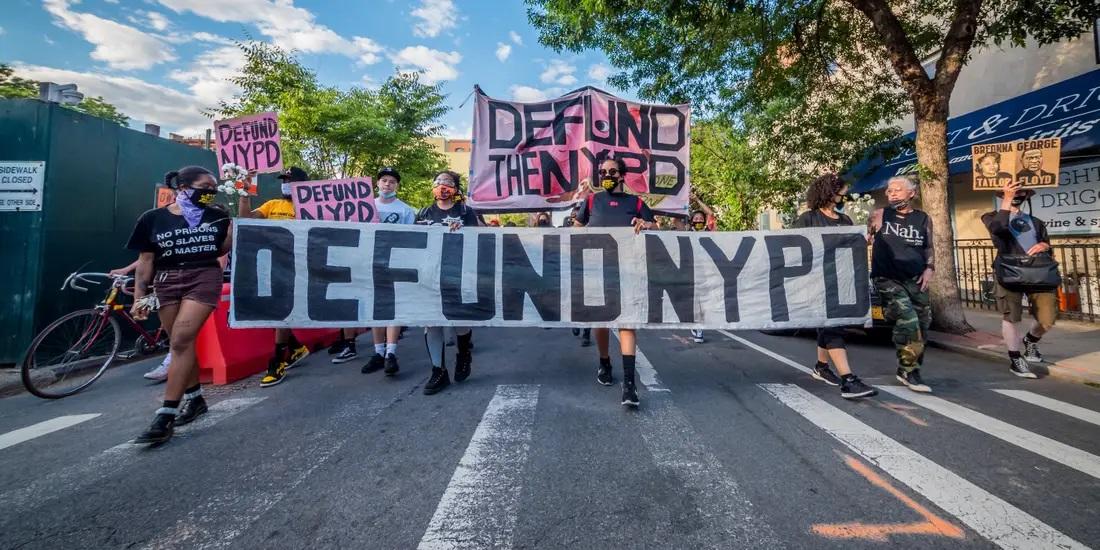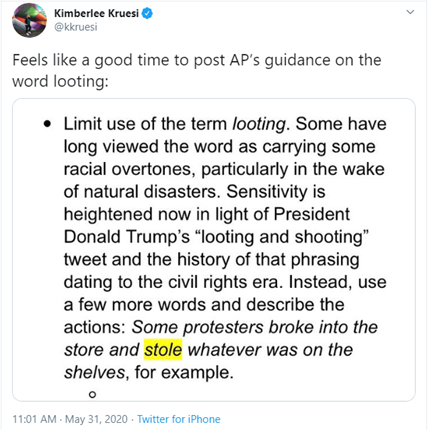‘Dangerous’ Language Like “Defund The Police”
Tyler Durden
Sat, 06/13/2020 – 19:30
Op-Ed by attorney and investigative journalist @Techno_Fog,
“Defund the police” is quite the rallying cry. It’s a policy statement in five syllables. The language is clear and meaning is impossible to miss. The next steps after defunding the police, however, do require explanation. To whom does a community turn for its security needs when a police force is defunded and therefore eliminated?
Once you understand that there is no good answer to this question, then you get why the media has designated itself as the spokesperson of the movement. It becomes clear why the media has so graciously explained to us, the dumb public, why defunding the police does not mean defunding the police. Take this explanation published in the Washington Post:
“Defunding the police means shrinking the scope of police responsibilities and shifting most of what government does to keep us safe to entities that are better equipped to meet that need. It means investing more in mental-health care and housing, and expanding the use of community mediation and violence interruption programs.”
Of course, the movement disagrees. The New York Times is running op-eds with the title “Yes, We Mean Literally Abolish the Police” by an author whose stated goal is “to abolish prisons and police.”
And it was @TomCottonAR’s Op-Ed that was considered *dangerous* to inner-city communities — Opinion | Yes, We Mean Literally Abolish the Police – The New York Times https://t.co/BegO4nhWEQ
— James A. Gagliano (@JamesAGagliano) June 13, 2020
Or, look to the public humiliation of Minneapolis Mayor Jacob Frey. Standing before a crowd of hundreds and beneath an angry woman on the microphone, Frey was straight-up asked, “Will you defund the Minneapolis police department?”
Frey answered, “I do not support the full abolition of the police.”
“I do not support the full abolition of the police,” Mayor Jacob Frey of Minneapolis said when he was put on the spot at a rally on Saturday. With that, protesters yelled “Go home, Jacob, go home!” and “Shame! Shame!” https://t.co/573TsGf4fW pic.twitter.com/NJF4hTErYm
— The New York Times (@nytimes) June 7, 2020
And with that response he was summarily dismissed with the speaker’s cry of “Get the fuck out of here.” He exited through the crowd a defeated man as his constituents – and in all likelihood, his former supporters – flipped him off and cussed him out.
Remarkably, Frey’s inquisition did not include questions about his position on “shifting the scope of police responsibilities” or public funding of community social programs. Frey wasn’t asked these questions because that wasn’t the mob’s demand. There was no potential for nuance and no potential for disagreement. Cutting police funding by 50% would not have been enough. They wanted it all gone.
Meanwhile in Seattle, the city has lost city hall. Protesters have essentially taken over territory in the city and established the Capital Hill Autonomous Zone. There are stories that businesses and people passing through the area are being shaken down for cash. Per media reports, the protesters refuse to leave until their demands are met – including the demand that the Seattle police department be disbanded.
During the riots that tore apart communities across America, the media excused the mob’s behavior because they agreed with the mob’s anger. Now the media misrepresents the mob’s demands because the media agrees, to an extent, with the mob’s politics.
In principal, this is no different than what Orwell described in his criticism of political writing:
“[P]olitical language has to consist largely of euphemism, question-begging and sheer cloudy vagueness… People are imprisoned for years without trial, or shot in the back of the neck or sent to die of scurvy in Arctic lumber camps: this is called elimination of unreliable elements.”
Similarly, defunding the police becomes shifting police responsibilities. Riots become an uprising. AP guidance replaces looters with protesters who stole whatever was on the shelves.
The departure from objectivity (or at least the appearance of objectivity) is no longer just being defended on moral grounds. It is now claimed to be an existential necessity. The existential movements – global warming, Black Lives Matter, systemic racism – are now claimed to be objective truths, and so all reporting and all opinions on those topics must express one point of view. Objectivity has become that which advances the just social cause.
“Moral clarity” is, first and foremost, about objective facts. Nazis are bad – objective fact. Black lives matter – objective fact. Climate change is real – objective fact. President Trump is a liar – objective fact
— Wesley (@WesleyLowery) June 11, 2020
American view-from-nowhere, “objectivity”-obsessed, both-sides journalism is a failed experiment. We need to fundamentally reset the norms of our field. The old way must go. We need to rebuild our industry as one that operates from a place of moral clarity
— Wesley (@WesleyLowery) June 4, 2020
This puts into perspective the York Times writers’ revolt against the New York Times’ publication of Tom Cotton’s op-ed, which discussed President Trump’s option of deploying the troops to stop rioters from taking “innocent lives” and destroying “the livelihoods of law-abiding citizens.” Cotton’s measured argument was deemed to put black lives in danger. Again, it’s an existential issue.
Running this puts Black @NYTimes staff in danger. pic.twitter.com/u3btzGTJzi
— Caity Weaver (@caityweaver) June 3, 2020
It isn’t difficult to see against what – or whom – this media movement turns next. If climate change poses a fundamental threat to the earth, then dissention against the prevailing climate views must be stopped. If our institutions are systemically racist, then they’ll use all available options to defeat the instruments of oppression. And if you dare stray from the new “consensus”? Good luck.

